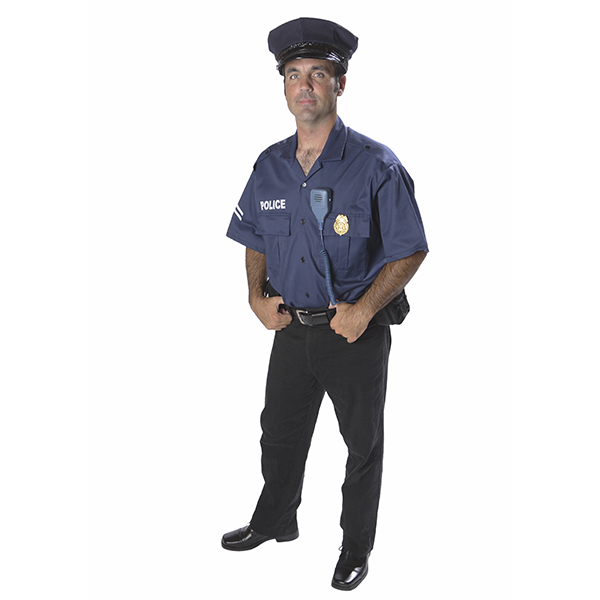Police Officer
Police officers are men and women who ensure the safety of property and citizens while enforcing community laws. They are responsible for apprehending criminals and detecting and preventing crime while maintaining public order. They have the power to arrest people they suspect of criminal action and detain them at the police station. Sometimes they are sworn to an oath. There are many different types of police officers, ranging from patrol officers to detectives to police commissioners.
Education
 If you are still in high school, you may want to join the Youth Police Explorers in your area to give you a good sense of what police work is like. You should also contact your local police department to arrange ride-alongs and see if you can apply for a cadet program. A high school diploma is the minimum education requirement to apply to become a police officer, but achieving a Bachelor’s degree in a relative field such as criminal justice is highly recommended, and can only help you in the end. You then apply to a police department. You will need to pass hearing, vision, agility and strength tests to go along with written examinations, drug tests, and a series of interviews to determine your character. Once you are accepted, you will be placed in a policy academy to undergo the necessary training prior to becoming a police officer. These training programs vary depending on what kind of police officer you are applying to be. For example, there are different training programs for a New York City officer (https://www.nyc.gov/html/nypd/html/police_academy/police_academy.shtml) and a N.Y. State officer (https://www.troopers.ny.gov/Academy/).
If you are still in high school, you may want to join the Youth Police Explorers in your area to give you a good sense of what police work is like. You should also contact your local police department to arrange ride-alongs and see if you can apply for a cadet program. A high school diploma is the minimum education requirement to apply to become a police officer, but achieving a Bachelor’s degree in a relative field such as criminal justice is highly recommended, and can only help you in the end. You then apply to a police department. You will need to pass hearing, vision, agility and strength tests to go along with written examinations, drug tests, and a series of interviews to determine your character. Once you are accepted, you will be placed in a policy academy to undergo the necessary training prior to becoming a police officer. These training programs vary depending on what kind of police officer you are applying to be. For example, there are different training programs for a New York City officer (https://www.nyc.gov/html/nypd/html/police_academy/police_academy.shtml) and a N.Y. State officer (https://www.troopers.ny.gov/Academy/).
Job Description
 Police officers protect the property and lives of citizens on a daily basis. They catch lawbreakers, maintain order, and work to prevent crimes. They patrol assigned areas to maintain a visible police presence while assisting other officers. They respond to emergency and routine calls, administering CPR or First Aid as required or assisting accident or crime victims. They may assist with vehicle patrol operations or patrol the freeways looking for traffic violations. They also assist with the preservation and containment of crime scenes. Some officers may be assigned to work in the records department or crime laboratory at the station. Every officer is required to file incident reports, and many end up testifying at hearings and trials. No day is the same for a police officer, as you may be setting up a speed trap on one day while assisting with a homicide scene the next day.
Police officers protect the property and lives of citizens on a daily basis. They catch lawbreakers, maintain order, and work to prevent crimes. They patrol assigned areas to maintain a visible police presence while assisting other officers. They respond to emergency and routine calls, administering CPR or First Aid as required or assisting accident or crime victims. They may assist with vehicle patrol operations or patrol the freeways looking for traffic violations. They also assist with the preservation and containment of crime scenes. Some officers may be assigned to work in the records department or crime laboratory at the station. Every officer is required to file incident reports, and many end up testifying at hearings and trials. No day is the same for a police officer, as you may be setting up a speed trap on one day while assisting with a homicide scene the next day.
Pros & Cons
First and foremost, being a police officer is a very dangerous job. According to the U.S. Labor Department, police work is the 5th most dangerous job in America. As a police officer, you are putting your life on the line everyday on the job. The job demands are enormous, and burnout and occupational stress are high in this field. This can put a strain on your home and family life. You may miss birthday parties and family dinners due to working overtime or the shift you are on. Sometimes the daily pressure of the job results in substance and alcohol abuse, putting even more strain on your body and family. While these are some serious consequences, there are many advantages. Police officers get excellent work benefits, including sick leave, paid holidays, insurance and pension plans. Employment opportunities remain high, and with the necessary training and education you have a great chance of being hired. Police officers are also admired and respected by citizens, and are considered heroes by many people. You also have a chance for early retirement. If you are dedicated and committed to serving and protecting members of the community, police work can be very rewarding.

